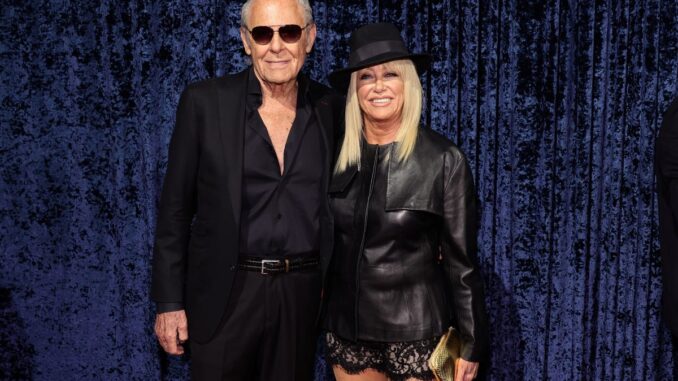
Suzanne Somers, beloved actress and television icon, captured hearts for decades with her role on Three’s Company and her empowering wellness advocacy. Two years after her passing, fans are stunned to see her presence again — not on screen, but through a hyper-realistic AI clone created by her husband.
This astonishing technology raises questions about legacy, ethics, and the future of entertainment, while offering fans a chance to reconnect with Somers in a way that was once pure science fiction.
Suzanne Somers — A Hollywood Legend
From Three’s Company to Wellness Icon
Suzanne Somers rose to fame in the 1970s as the charming and witty Chrissy Snow on Three’s Company. Beyond acting, she became an influential wellness advocate, author, and entrepreneur. Her infectious personality and charisma made her a household name.
Legacy Beyond the Screen
Somers’ contributions to pop culture weren’t limited to acting. She inspired generations with her openness about health, fitness, and personal empowerment, leaving a legacy that continues to resonate today.
The Digital Resurrection
Creating the AI Clone
Two years after Somers’ death, her husband took a bold step: creating an AI clone using advanced machine learning and deepfake technology. This digital version of Suzanne can interact, speak, and even mimic her expressions with astonishing accuracy.
Fan Reactions
Fans are both amazed and emotional. Many report feeling like they are seeing Somers in person. “You can’t tell the difference,” her husband said. “It’s amazing. It feels like she’s here again.”
How the AI Technology Works
Deep Learning Meets Legacy
The AI clone was built using hundreds of hours of video footage, interviews, and public appearances. Sophisticated algorithms analyzed her voice, gestures, and facial expressions to create a fully interactive digital persona.
Realism at Its Peak
The AI isn’t just a static hologram — it responds to prompts, recalls phrases she often used, and recreates her mannerisms so accurately that it feels like interacting with the real Suzanne.
Ethical Questions Arise

Can Digital Clones Replace the Deceased?
While fans celebrate, some ethicists are raising concerns. Is it appropriate to recreate a person digitally after they’ve passed? Does it honor their legacy, or commodify their image?
Consent and Legacy
Somers’ husband insists the project respects her wishes and celebrates her life. Still, AI recreations open debates about consent, intellectual property, and the line between tribute and exploitation.
The Emotional Impact on Fans
Nostalgia Meets Innovation
For longtime fans, seeing Somers’ AI clone evokes powerful emotions. It’s not just nostalgia — it’s the thrill of connecting with someone thought lost forever.
Bridging Generations
Younger audiences, unfamiliar with the original Three’s Company, are also discovering Somers’ charm through AI interactions, creating a unique bridge between eras of television.
Technology Behind the Scenes
AI Modeling and Facial Recreation
The creation relied on advanced AI modeling to reconstruct her face in high definition, down to subtle expressions like eyebrow raises and smiles. Every micro-expression is captured, ensuring authenticity.
Voice Synthesis
Using voice cloning technology, the AI reproduces her tone, pitch, and inflection. Conversations feel natural, and the voice reacts dynamically to questions — making the experience eerily lifelike.
Applications Beyond Entertainment
Preserving Cultural Icons
This AI model isn’t just for nostalgia. Studios could potentially use it to preserve performances, create interactive museum exhibits, or even produce new content featuring stars long gone.
Educational Use
Somers’ AI could inspire future generations in acting, wellness, and motivational speaking, allowing her wisdom to transcend her physical life.
Legal Considerations
Rights to Digital Likeness
As AI clones become more common, legal frameworks struggle to keep up. Questions about royalties, licensing, and posthumous rights are increasingly relevant.
Protecting the Deceased
Experts recommend explicit contracts or clear estate directives to prevent misuse of digital recreations — a lesson learned from early AI experiments in entertainment.
Family’s Role in the Project
Husband as Guardian of Legacy
Somers’ husband led the initiative with care, emphasizing that the AI clone is a tribute, not a replacement. His involvement ensures that Suzanne’s personality, humor, and authenticity are preserved.
Emotional Closure
Creating the AI may also have provided personal comfort to her family, helping them navigate grief while keeping her memory alive in a modern, interactive way.
Fan Experiences and Stories
Virtual Encounters
Fans interacting with the AI report feelings of joy, surprise, and a sense of intimacy. One wrote, “It’s like she never left. Seeing her respond to me is incredible.”
Social Media Buzz
Videos of the AI interacting with fans have gone viral, sparking global discussion about the intersection of technology, nostalgia, and human emotion.
Future of AI in Entertainment
Digital Resurrection Trend
Suzanne Somers’ AI is part of a growing trend in which AI recreates deceased actors for movies, commercials, and interactive experiences.
Balancing Ethics and Innovation
The challenge lies in balancing technological possibilities with respect for human legacy. Somers’ project may set a precedent for future AI memorials done thoughtfully and responsibly.
Critics’ Perspectives
The Fine Line Between Tribute and Exploitation
Some critics warn against overreliance on AI, arguing that it risks commodifying deceased personalities for entertainment rather than celebrating them authentically.
A New Ethical Frontier
The Somers AI project sparks debate about where admiration ends and ethical caution begins — a conversation that will likely shape future AI recreations.
Technology Meets Emotion
Why It Feels Real
The uncanny realism of the AI clone works because it doesn’t just mimic appearances; it mimics the soul of Suzanne Somers — her voice, humor, timing, and warmth.
Fans’ Emotional Connection
The human brain responds emotionally to lifelike interactions, explaining why viewers feel as though they’re experiencing Somers’ presence firsthand.
What Suzanne Somers’ AI Teaches Us
Legacy Can Be Preserved Digitally
Her AI clone demonstrates how technology can immortalize personalities, making cultural icons accessible to future generations.
Innovation Meets Tribute
By combining cutting-edge AI with deep respect for Somers’ legacy, this project offers a model for how technology can honor the past without erasing humanity.
Conclusion: A Digital Tribute That Feels Alive
Suzanne Somers’ AI clone isn’t just a technological marvel — it’s a heartfelt tribute to a beloved TV icon. Two years after her death, fans can experience her wit, charm, and presence in a way previously unimaginable.
While ethical debates will continue, the project proves that innovation, when guided by respect and love, can create something magical — a chance to reconnect with legends, even after they’ve left this world.
Her digital resurrection reminds us that while life is finite, impact and inspiration can be virtually eternal.
